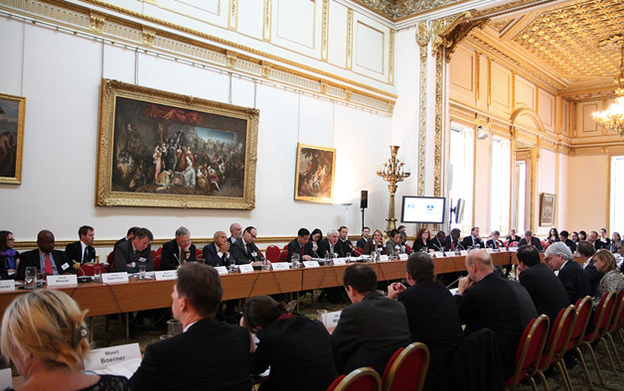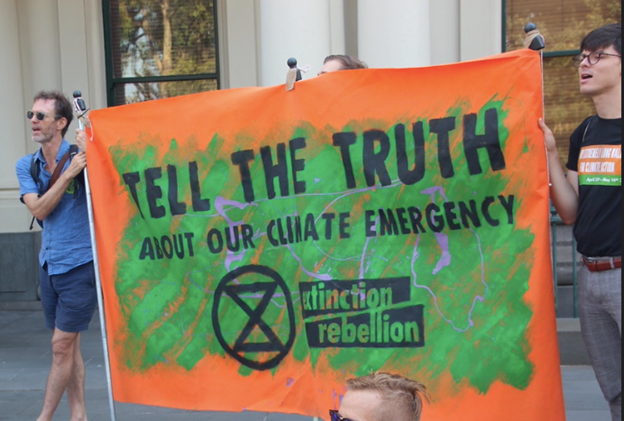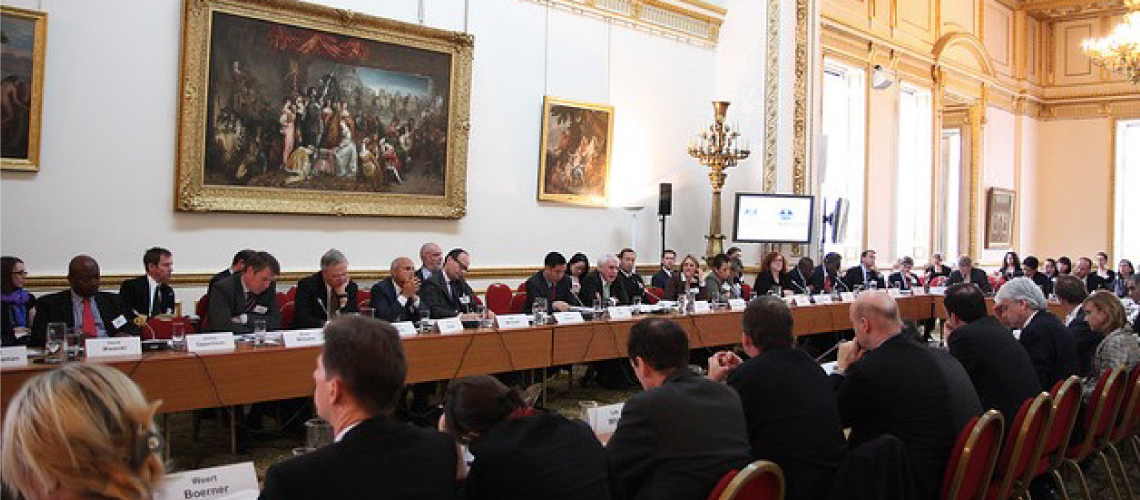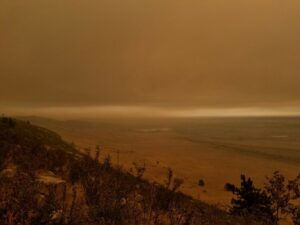Guest Post by Julie Liebenguth, Ph.D. Candidate in the Department of Political Science and Trainee in the CSU InTERFEWS Program
The current ecological condition in which we find ourselves—defined by intense disasters, prolonged drought, increased warming, sea-level rise, the spread of toxic waste, and countless forms of social and environmental exploitation—carries a tangible element of urgency, as such trends incite public debate about survival, livelihoods, displacement, inequality, public health, and sometimes even conflict. Interestingly, this sense of urgency has compelled various scholars, governments, development practitioners, and activists to turn toward the language of security to convey the increasingly dire need to confront widespread ecological change. Traditional security policies, however, call for militaries trained for combat, environmentally detrimental warfare, and competition among countries. Is this logic suitable for addressing shared environmental challenges that instead require cross-border cooperation, long-term thinking, and respect and recognition for humans and nature?

My research examines how global discourses about environmental issues incorporate security language to give practical and theoretical meaning to the emerging concept of environmental security. While environmental security remains a hotly contested idea, it is nonetheless an increasingly popular conceptual framing used by global actors who are concerned with stemming the dangerous ramifications of environmental change (Floyd and Matthew 2013). It is important to keep in mind, though, that security scholars have long warned about the uniquely powerful force of security rhetoric, which has the distinct ability to distinguish certain people, communities, or events as threatening, legitimate, or illegitimate, making security discourses profoundly indicative of the way people identify with one another and the political space around them (Browning and McDonald 2011). Thus, it is crucial to understand how placing the environment alongside notions of security shapes the way environmental issues are understood and also governed by whom and for whom. In short, how we conceptualize environmental security will shape our response to environmental challenges.
Living in the United States, I see securitization of the environment often, both in policy circles and in popular media. As a scholar of political science, this provokes compelling questions about current relationships across states, their governments, and who offers protection.
Environment – Security Connections
Concerns about the environment as an issue related to security grew as the end of the Cold War altered Western perceptions about the inevitability of “super-power” conflict. A global landscape characterized by accelerated trade and production, rather than inter-state war, created space for security scholars and other global actors to consider non-military threats like environmental change. And the 1994 UN Development Program formally introduced environmental security as a new component of the UN’s wider outlook on human security issues (UNDP 1994).
Those embracing the analytical connection between the environment and security have since adapted their terminology to speak to a wide spectrum of environmental “threats” including climate change, transboundary pollution, natural disasters, and resource scarcities. The scope and emphasis of environment-security connections, however, is deeply contested. Whereas some argue that an environmental security lens generates important insight into the vulnerabilities driven and exacerbated by environmental change (Hardt 2018), others caution against militarizing environmental politics, diminishing the rigor of security theories, and obstructing cooperative resolutions to shared environmental problems by invoking conflict-oriented perspectives (Deudney 1990).
At the same time, we should recognize that not all environmental security discourses are the same. In fact, they vary immensely and imply vastly different ways of understanding environmental challenges. For instance, some emphasize how environmental scarcities can induce substate conflict (Homer-Dixon 1999), others intentionally avoid a conflict-oriented perspective and highlight the cooperative negotiation that can likely occur over shared environmental risks (Conca and Dabelko 2002). Some argue that environmental degradation is best understood as a threat to human security (Barnett and Adger 2007), and others focus on the inextricable ties between human well-being and the health of ecological systems to which we belong (McDonald 2018). Given this variation, then, we can imagine how responses driven by each narrative might range from preparation for conflict, peace building, global aid, to radically transforming the way humans interact with nature.

Food, Energy, Water (FEW) Security
My current research specifically focuses on how environmental security is conceptualized within the food, energy, water (FEW) nexus—a popular development framework that is gaining notoriety within global debates about environmental change and sustainable development (Hoff 2011). The FEW nexus approach seeks to locate synergies across food, energy, and water sectors in order to increase the efficiency through which we can mitigate related environmental challenges. As FEW nexus policy prescriptions are increasingly securitized (discussed and understood through the lens of security), my research finds that such spaces produce an environmental security narrative that situates economic productivity as that which is most at risk from threats posed by natural resource scarcities (Liebenguth 2020). This has implications for who is then deemed suitable for responding to such threats, which in this case, turns out to be private sector actors, namely for-profit businesses and corporations.
Within this context, my work specifically aims to understand how this specific environmental security discourse impacts the authority of transnational corporations operating across the FEW nexus. I find that similar environmental security narratives feature prominently in attempts on behalf of transnational corporations involved in oil and gas, agriculture, and water management to assert their legitimacy within different domains of global environmental governance, including the governance of extractive practices, agricultural production, and water privatization. This should compel us, then, to ask whether transnational corporations are appropriate agents of environmental security and to what extent this particular discourse, which privileges private actors and economic growth, helps us to tackle unevenly distributed ecological risks? Additionally, what alternative versions of environmental security can those of us concerned about food, energy, and water issues propose to (1) widen the scope of agency over environmental security issues and (2) generate more equitable and just responses to today’s most pressing environmental challenges?

References:
Barnett, J., and W. Adger. 2007. Climate Change, Human Security and Violent Conflict. Political Geography 26 (6): 639–655
Browning, C., and M. McDonald. 2011. The Future of Critical Security Studies: Ethics and The Politics OfSecurity. European Journal of International Relations 19(2): 235–255.
Conca, K., and G. Dabelko (eds.). 2002. Environmental Peacemaking. Woodrow Wilson Center Press
Deudney, D. 1990. The case against linking environmental degradation and national security. Millennium 19 (3): 461-476.
Floyd, R., and R. Matthew. 2013. Environmental security: approaches and issues. Routledge.
Hardt, J.N., 2017. Environmental security in the Anthropocene: Assessing theory and practice. Routledge.
Hoff, H. 2011. Understanding the Nexus. Background Paper for the Bonn2011 Conference: The Water, Energy and Food Security Nexus. Stockholm Environment Institute, Stockholm.
Homer-Dixon, T. 1999. Environment, Scarcity, and Violence. Princeton University Press.
Liebenguth, J. 2020. Conceptions of Security in Global Environmental Discourses: Exploring the Water-Energy-Food Security Nexus. Critical Studies on Security, 8(3), 189-202. Chicago
McDonald, M., 2018. Climate change and security: towards ecological security?. International Theory 10(2), 153-180.
United Nations Development Programme. 1994. Human Development Report. Oxford University Press.






